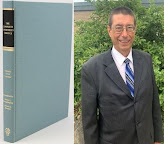This continues from Excursus 2 (or Part 16) (Table of Contents in Part 1) in a series presenting an English translation of C. F. W. Walther's 1876 essay “The ‘Carrying’ of Melanchthon on the Part of Luther.” — Following Leonhard Hutter of the 17th century, we now present perhaps the greatest defender of Lutheranism in the 18th century, Valentin Ernst Loescher. Walther makes frequent use of Loescher in his essay on Luther and Melanchthon, and so a translation in 1998 of one of Loescher's most important books by Prof. emeritus (now Pastor) James L. Langebartels' would have won for Langebartels much praise from Walther. The book's title is The Complete Timotheus Verinus and is still offered by Northwestern Publishing House. In his "Foreword", Langebartels states:
“Pietism made religious experience more important than Christian doctrine and stressed sanctification more than justification. Not enough attention, however, has been given to the Orthodox Lutheran response to Pietism. Historians have devoted much print to the leaders of Pietism like Philipp Jacob Spener (1635-1705) and August Hermann Francke (1663-1727), but few words have been written about their most capable opponent, Valentin Loescher. Valentin Ernst Loescher was the last great representative of Lutheran Orthodoxy in the 18th century.”
Although this book is not specifically about Luther and Melanchthon, yet Loescher references the seeds of error that crept into Lutheranism especially after Luther's death. The book was composed at two different times in two sections. The following are excerpts from the references to Melanchthon:
Valentin Loescher:
Part I (1718), p. 10
“Things happened about the same in our grandfathers’ time [17th century] with the Crypto-Calvinists. The seed, which sprouted soon after Luther’s death, consisted of the excessive respect and love that just about everyone had for Melanchthon, of Melanchthon’s all too political and philosophical mind, and of his secret inclination toward the Swiss doctrine of the Lord’s Supper. The evil sprouted and grew: through the altering of the Augsburg Confession, and its acceptance in place of the unaltered version.”
Compare Loescher's judgment of Melanchthon to Dr. Rod Rosenbladt's comment in Part 5 that "[Melanchthon] made some bad moves under political pressure., <great emphasis> terrible pressure." The difference in judgment is that Dr. Rosenbladt uses this "political pressure" to justify Melanchthon's "bad moves", while Loescher assigns the blame for Crypto-Calvinism in part to these "bad moves". Rosenbladt has to face the fact that Prof. Bente is not the first to put the "black hat" on Melanchthon.
In Loescher's Part II in 1721 (translated by R. Koester), he stated, p. 3:
“This is how it was during the unhappy time that Melanchthon, a man who had been held in such high honor, brought on our church after Luther’s death. No one was allowed to touch the evil of so-called Philippism; and so Calvinism and other evils daily gained ground until God came to our aid through the efforts of a few theologians who suffered much and who finally gave us the Formula of Concord.”
Loescher reveals the antidote to “Philippism” on p. 150:
“Sometimes it may happen that philosophical pragmatism plagues me—something about which Luther faithfully warned Melanchthon—and I want to be able to make everything good and right. When I battle with these thoughts, however, I must bring myself back to understand and believe that God’s Word alone and the judgment it forces me to make if I am to deal with the circumstances properly, must remain the tool to overcome all obstacles.”
Yes indeed, dear Loescher, you are to be revered in the Lutheran Church of all time because you brought yourself back to
“believe that God’s Word alone … must remain the tool to overcome all obstacles.”
I have to thank Dr. Rosenbladt and his "Thinking Fellows" associates for driving me deeper into orthodox Lutheran historians like… Valentin Loescher. (Next Part 17)


.jpg)
%20crop.jpg)
No comments:
Post a Comment
Comments only accepted when directly related to the post.